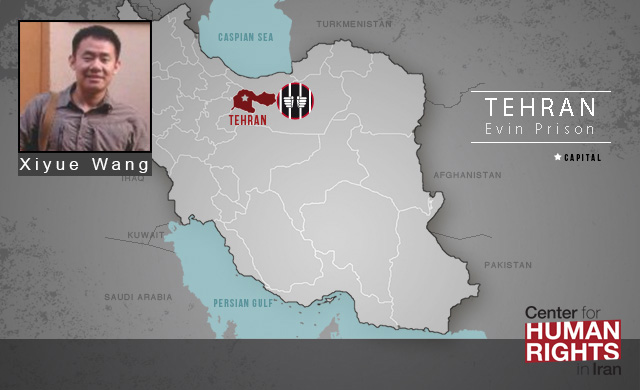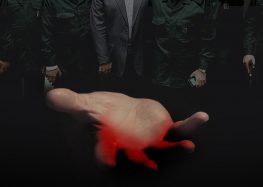Details of US Student’s 10-Year Sentence in Iran Reveal Yet Another Arbitrary Prosecution of a Western National

Xiyue Wang, a graduate student in history at Princeton University, has been sentenced to 10 years in prison in Iran on unspecified espionage charges.
July 17, 2017—The Iranian judiciary’s sentencing of American academic researcher Xiyue Wang to 10 years in prison on unspecified espionage charges reflects the continued ability of security and intelligence agencies to dictate unlawful and arbitrary judicial prosecutions of Western nationals, the Center for Human Rights in Iran (CHRI) said in a statement today.
“Over and over again we’re seeing foreigners who were legally allowed to enter Iran being imprisoned as political playing cards by hardliners who want to use them as hostages in their dealings with Western countries,” said CHRI’s Executive Director Hadi Ghaemi.
“The Rouhani administration has aimed to present Iran as an open and welcoming place to visitors, but the continued entrapment of western nationals with bona fide visas reflects a politicized justice system that sends a very different message,” he added.
Judiciary Spokesman Gholamhossein Mohseni Ejei did not name the “American infiltrator” he accused of spying during the press conference where he announced the sentence on July 16, 2017, but the judiciary’s official news agency, Mizan, quoted an anonymous source identifying Wang, a 37-year-old American-Chinese graduate student at Princeton University.
Allegations about detainees in politically motivated cases are routinely leaked to right-wing news outlets by the arresting authority in order to create a misinformation campaign about the detainee that will mute any potential public criticism of their subsequent prosecution.
The article by Mizan, which maintains close ties with Iran’s security establishment, suggested Wang was targeted because of the institutions he is affiliated with in his academic work.
Mizan said Wang is a graduate student in history at the Sharmin and Bijan Mossavar-Rahmani Center for Iran and Persian Gulf Studies at Princeton University and claimed he has “collaborated” with the British Institute of Persian Studies at Harvard’s Kennedy School.
The center aims to “support teaching and research on all aspects of Iran and Persian Gulf studies and to create and support productive and innovative connections across departments throughout the University,” according to its website.
The center also “provides summer grants to graduate students pursuing research and intensive language training primarily related to the scholarship of Iran and the Persian Gulf.”
In its article, Mizan claimed the center “was engaged in a web of ties with US and British political, security and intelligence agencies.”
In a statement issued on July 16, the Office of Communications of Princeton University said the university is “very distressed by the charges brought against [Wang] in connection with his scholarly activities, and by his subsequent conviction and sentence…and hopeful that he will be released after his case is heard by the appellate authorities in Tehran.”
“Xiyue Wang is a fourth-year doctoral candidate (graduate student) in the Department of History at Princeton University,” added the statement. “His field is late 19th and early 20th century Eurasian history. He was arrested in Iran last summer, while there doing scholarly research on the administrative and cultural history of the late Qajar dynasty in connection with his PhD dissertation.”
“Since his arrest, the university has worked with Mr. Wang’s family, the US government, private counsel and others to facilitate his release,” said the statement.
Without providing any details about Wang’s alleged crimes or information about his defense, Ejei claimed that “this infiltrator, who had two nationalities, one of them being US, entered Iran in a particularly sneaky way.”
“He was identified and arrested by Intelligence Ministry agents and it became obvious that he was involved in gathering intelligence,” Ejei said, adding, “The sentence against this person can be appealed and if it is proven in court that he was receiving direct guidance from the US, then I might be able to give more information about his activities.”
“The judiciary spokesman’s claim that Wang entered Iran in a ‘sneaky’ way is blatantly false,” said Ghaemi. “All researchers and scholars who travel to Iran obtain proper visas to do their work, and Wang acquired information from publicly available archives.”
“It’s stunning that after one part of the government issues permission for a visitor to enter, another part carries out that person’s arrest,” he added.
The judiciary’s ongoing imprisonment of dual nationals and foreign visitors contradicts Rouhani’s repeated calls for expatriates to return to Iran. The growing number of arrests also reflects hardliners’ efforts to prevent the engagement with the West that the Rouhani administration has sought to encourage.
The Islamic Revolutionary Guard Corps (IRGC) has historically arrested the majority of visitors who have been detained in Iran, but since 2015 an increasing number have been arrested by the Intelligence Ministry.
Iranian-born Swedish resident and emergency and disaster medicine expert Ahmadreza Djalali was arrested by the Intelligence Ministry in April 2016 while visiting Tehran on an official invitation from Tehran University.
“The fact that Wang was arrested by the Intelligence Ministry, which operates under Rouhani, is another indication of how the ministry has become a force of repression in Iran,” said Ghaemi.
Under a photo of Wang included in the post by Mizan, which published Ejei’s comments, the far-right website described Wang as a “spy disguised as a researcher” who “digitally recorded 4,500 pages of official documents” from libraries in Tehran and Iranian academics.
On June 19, Judiciary Chief Sadegh Larijani claimed domestic agents were working with an unnamed infiltrator.
“In recent months the threat of infiltration has increased and all the relevant institutions should monitor all aspects of it,” he said.
“Unfortunately, there are some people inside the country who are showing the green light to enemies and sending certain signals to entice them. These people are either ‘enemy combatants’ or ‘corrupt on earth,’” added Larijani, citing charges that are punishable by death according to Iran’s Islamic Penal Code.
At least 12 foreign nationals are currently imprisoned in Iran, including three with US citizenship: Siamak Namazi, his father Baquer Namazi, and Karan Vafadari.






